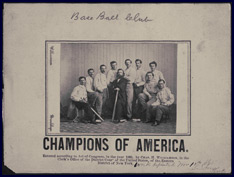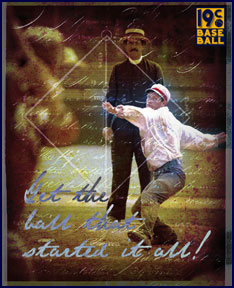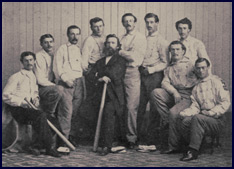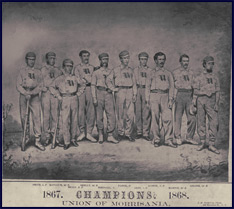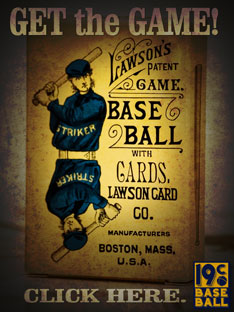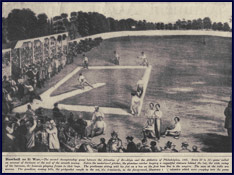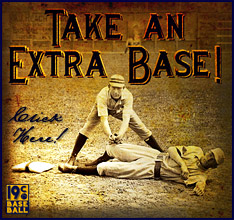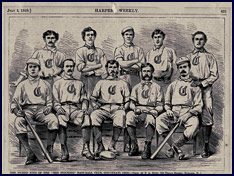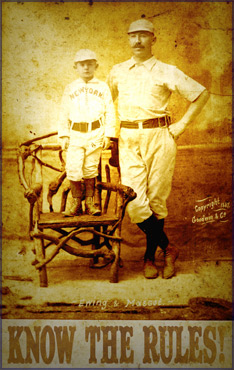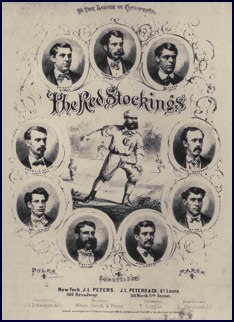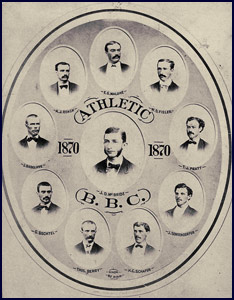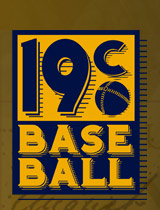Champions 1860–1869
By Eric Miklich
1860: Excelsior Club of Brooklyn*

he effectiveness of a skilled pitcher was as evident during the 1860 season as it is today. The team that finished with the best record also had the best pitcher to date and possibly the entire decade. At this time the majority of the pitching was done with a soft underhand motion. Jim Creighton, a pitching pioneer, pitched with the mindset of retiring batters as opposed to simply delivering the baseball to be put in play. Creighton moved from the Star Club of Brooklyn to the Excelsior Club of Brooklyn in 1860 and led them to a 19-2 season record. During their 21 games, the Excelsiors allowed 10 or more runs only five times and never allowed an opponent to score 20 runs. Opponents averaged a mere 7.9 runs per game against Creighton and the Excelsiors. Conversely, the 15-2 Eckford Club of Brooklyn allowed their opponents to score 10 or more runs 13 times in 17 matches and three times allowed their opponent to score more than 20 runs. The Atlantic Club of Brooklyn, who finished 13-3-1, allowed their competition to score 10 or more runs 13 times in 16 matches and 20 or more runs three times. The 8-1-4 Gotham Club of New York allowed 10 or more runs in all of their matches except their final contest on October 8th. Both the Eckford and Gotham Clubs allowed an average of over 14 runs per game and the Atlantic's allowed over 13 runs per game.
After a shocking season opening 12-11 defeat to the surprising Charter Oak Club of Brooklyn (5-2), the Excelsiors proceeded to win 12 straight matches. Included in those wins were six matches played against northern New York teams and two against "southern" clubs, during the first organized baseball tour. (*It is noted that the competition on the tour was not the same caliber as what existed in New York and Brooklyn at that time). During the tour the Excelsiors stopped in Brooklyn and played a home match against the powerful Atlantics at Court Street. On July 19th they soundly beat the Atlantic Club 23-4, in front of a reported 8,000 spectators and then moved on to Baltimore and Philadelphia and two more victories The second match against the Atlantics took place on the Atlantics grounds in Bedford, on the corner of Marcy and Gates Avenues on August 9th, in front of 12,000 spectators. The Excelsiors squandered an 8-0 lead and lost 15-14.
The third and deciding match was played on August 23rd at the Putnam Club Grounds at Gates and Lafayette Avenues in Brooklyn. A reported 20,000 spectators saw the Excelsiors take an 8-6 lead after five and a half innings. But the rowdy crowd became incited after shortstop Archie McMahon in the bottom of the fifth drove home the sixth run, was put out at third on a close play, after over running the base. McMahon began to berate the umpire Henry Thorn of the Empire BBC (Brooklyn), prior to the Atlantics batting in the bottom of the sixth which also fueled the crowd. The Excelsior Club withdrew from the field and the umpire incorrectly ruled the game a draw. The following is an excerpt from "The Game" section narrative which appeared after the 1860 rules:
"In case of a tie, at the close of the ninth inning, the game, by mutual consent, can be prolonged innings after innings until one or other of the contesting sides obtain the most runs. And if any thing occur to interrupt or put a stop to the game before five innings on each side have been played, the game must be drawn. The rules and regulations of the game define all further particulars in reference to it."
The two clubs would never play against each other again.
*Accepted champion: Atlantic of Brooklyn BBC (13-3-2).
1861: Mutual Club of New York**
The Mutual Club recovered from an abysmal 1860 season in which they were 1-8-2, to finish 4-2 against the top clubs and 8-2 overall in 1861. An opening season lost on July 5th to the Eckford Club of Brooklyn (8-4) was followed by eight straight victories including a 23-18 win over the Atlantics on October 3rd, their first ever over the Atlantics. In the return match played on October 16th at Bedford, Long Island, in front of 8,000 spectators, the Atlantics (5-2) thoroughly beat the Mutuals 52-27. A 31-11 season ending loss to the Liberty Club of New Brunswick (NJ) on October 28th and a schedule that featured only two quality matches eliminated the Atlantics from claming the championship.
Due to the Civil War many clubs reduced the number of matches they played as some of their players went to fight. The Excelsior Club and the Knickerbocker Club were not active at all.
On October 21, 15,000 witnessed an all-star match, similar to the 1858 matches, between clubs from Brooklyn and New York at the Mutual Grounds in Hoboken, NJ. Listed as the Grand Match for the Silver Ball, Brooklyn won 18-6 and took possession of the Silver Ball.
**Accepted champion: Atlantic of Brooklyn BBC (5-2).
1862: Eckford Club of Brooklyn
The Eckfords finished with a 7-1 record against the top clubs and 14-2 overall in 1862. They defeated the Mutuals (8-5) twice, 28-24 on October 24th and 28-14 on September 24th. The Eckford Club won two of three from the Atlantics (2-3). On October 11th the Atlantics were defeated 24-14, but won the second match easily 39-5 on October 18th. The final match was an excellent contest won by the Eckfords 8-3 on September 18th in front of a reported 10,000 at Union Grounds in Brooklyn. The Eckfords won 10 straight games after the 39-3 defeat to the Atlantics.
For the second straight year the Knickerbocker Club did not play a single match.
On consecutive days, June 5th and 6th, at the Union Grounds in Brooklyn, an all-star team made up from the top for clubs form Brooklyn beat an all-star team from Philadelphia, also comprised from the top four clubs in Philadelphia, 27-10 and 23-16.
On October 14th the Excelsior Club defeated the Unions of Morrisania (NY) 13-9. In this game pitcher Jim Creighton, 21 years old, hit four doubles and score four runs and but died four days later of strangulated intestine as a result of a hernia suffered earlier in the year.
1863: Eckford Club of Brooklyn
The Eckfords continued to dominate and completed the season 10-0, 7-0 against the top clubs, in 1863 and extended their winning streak to 20 straight matches, the longest to date. They defeated the Mutual Club (10-4) twice, the Atlantic Club (8-3) twice, the Union Club of Morrisania (3-3) twice and then Athletic Club of Philadelphia (7-5) once.
1864: Atlantic of Brooklyn BBC
The Atlantic Club thoroughly dominated their completion in 1864 finished 14-0-1 against the top clubs and 20-0-1 overall. They scored over 800 runs and allowed less than 230 during the season. After a tie match with the Empire Club of New York (7-13-2) in the third match of the season, the Atlantics won 18 straight matches, including a 5-0 record during their tour of Philadelphia, upstate New York and Canada.
The Atlantics also played two "fly matches" for the first time (fair batted balls were required to be caught before striking the ground to retire the batter), winning both against the Star Club of Brooklyn. The Atlantics won 35-16 on June 30th and won 35-17 on August 4th.
Dating back to the last three matches of the 1863 season, the Atlantics were undefeated in 24 straight matches.
1865: Atlantic of Brooklyn BBC
The Atlantics continued their winning ways and ended the 1865 season 15-0 against the top clubs and 18-0 overall. They increased their undefeated streak to 42 matches and their winning streak to 36 matches, eclipsing the winning streak set by the Eckford Club from 1862-1863.
In January the Atlantics won a series against the Gotham Club which was played on ice at the Capitoline Skating Pond, Sylvan Lake Skating Pond and the Washington Skating Pond, all in Brooklyn, two games to one.
1866: Union Club of Morrisania (NY)***
Although the Union Club, 11-3 and 25-3 overall, split with the Athletic Club of Philadelphia (7-2, 23-2), losing 33-20 on June 26th and winning 42-29 on October 27th, the Union Club faced stronger opponents. The Atlantics (8-1, 17-3) won their first game of the season extending their winning streak to 37 matches before losing to the Irvington Club of New Jersey (8-6) 23-17 on June 14th. The Atlantics also lost in Newark to the Eureka Club of Newark (9-6) on August 18th, 36-10, eliminating them from championship consideration.
***Accepted champion: Atlantic of Brooklyn BBC (17-3)
1867: Athletic Club of Philadelphia****
The Athletic Club of Philadelphia, touring yearly since 1863, completed the most extensive travel schedule of any club to date in 1867. They played matches in New England, Upstate New York, Pennsylvania, New York, New Jersey, Maryland and Washington DC.
The well-rounded Athletics finished the season 10-3 against top teams and 44-3 overall and defeated the Union Club of Morrisania in New York on August 19th, 23-10 and then again in Philadelphia on September 21st, 36-32. The Atlantics defeated the Athletics 28-16 in front of a reported 20,000 spectators at Capitoline Grounds, but lost the second match on September 23rd in Philadelphia 28-8. The Atlantics then refused to play the Athletics in New York on September 30th, claiming they had too many players injured in the September 23rd match and as a result forfeited any chance of being declared the champion.
The Athletics ended 1-2 against the Mutual Club (23-6-1). Including the final five games of the 1866 season, the Athletics won 31 straight matches before their being defeated by the Mutuals on August 8th, 23-20. After the second loss to the Mutuals on September 18th, 18-17, the Athletics won the final 15 games of the season.
The National Club of Washington finished 9-1 on the first great western base ball tour. They defeated the Cincinnati Club (soon to be known as the Red Stockings), 53-10; Cincinnati's only loss that season and the Nationals only loss was to the Forest City Club of Rockford, Illinois, 29-23. The Forest City Club featured Pitcher Albert Spalding and shortstop Ross Barnes. The Nationals (29-7) were 1-4 against teams from New York and Brooklyn..
****Accepted champion: Union Club of Morrisania (21-8)
1868: Athletic Club of Philadelphia*****
The Athletics bested their tour from the previous season and headed west after the success of the National Club of Washington's tour of 1867 and played matches as far as St. Louis, MO. In winning the first 25 games of the 1868 season, the Athletics increased their winning streak to 40 games, dating back to the final 15 games of the 1867 season and set the new mark.
Twice the Athletics defeated the Atlantics (47-7), 18-9 (8 innings) on October 31st in Philadelphia and 37-13 on September 7th in Brooklyn, in front of a reported 15,000 spectators. Two games with the Mutuals (31-10) were split, Athletics winning 51-24 on September 21st and the Mutuals winning 25-15 in six innings on October 14th. The other two losses by the Athletics were undoubtedly to weaker teams, June 29th in Rochester to the Excelsior Club of Rochester, 26-20 and the final game of the season, October 31st, 25-17 to the Nassau Club of Princeton (NJ), but no other team won more game or logged more miles during the season.
*****Accepted champion: Mutual Club of New York (31-10)
1869: Cincinnati Club******
Only the arrogance and ignorance of the Atlantic Club and the New York press would allow them to lay claim to the championship. It is easily seen that the Cincinnati Club, 57-0, had the greatest season in baseball history. Cincinnati completed the most prolific touring schedule, outdoing any club to this time. They traveled from Boston to San Francisco and generally won all matches by large margins. After winning the final eight games of the 1868 season, the "Red Stockings" ended the year winning 65 games in a row and defeated every top club at least once, including he Atlantics on June 16th in Brooklyn, 32-10.
******Accepted champion: Atlantic BBC (40-6-2)
